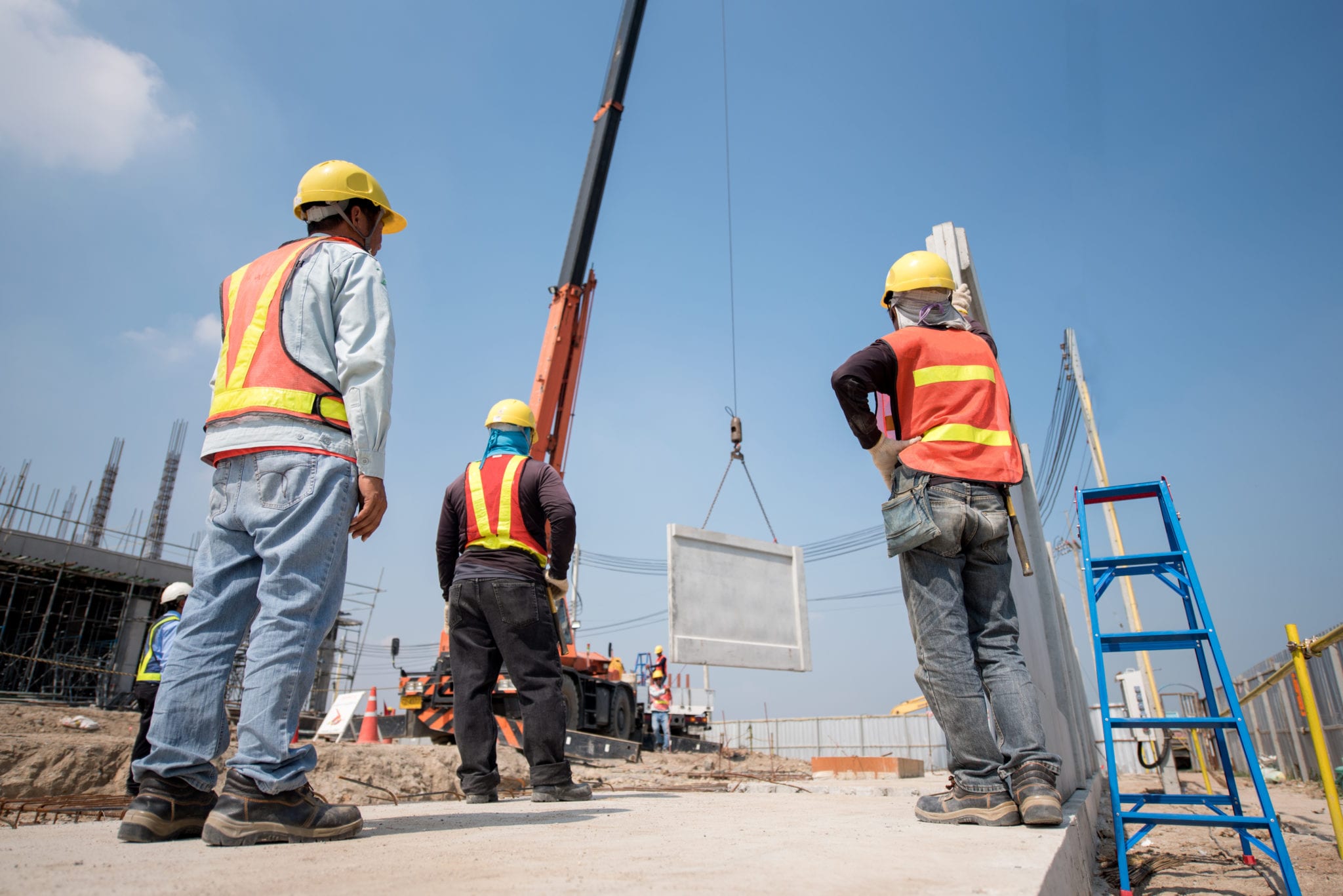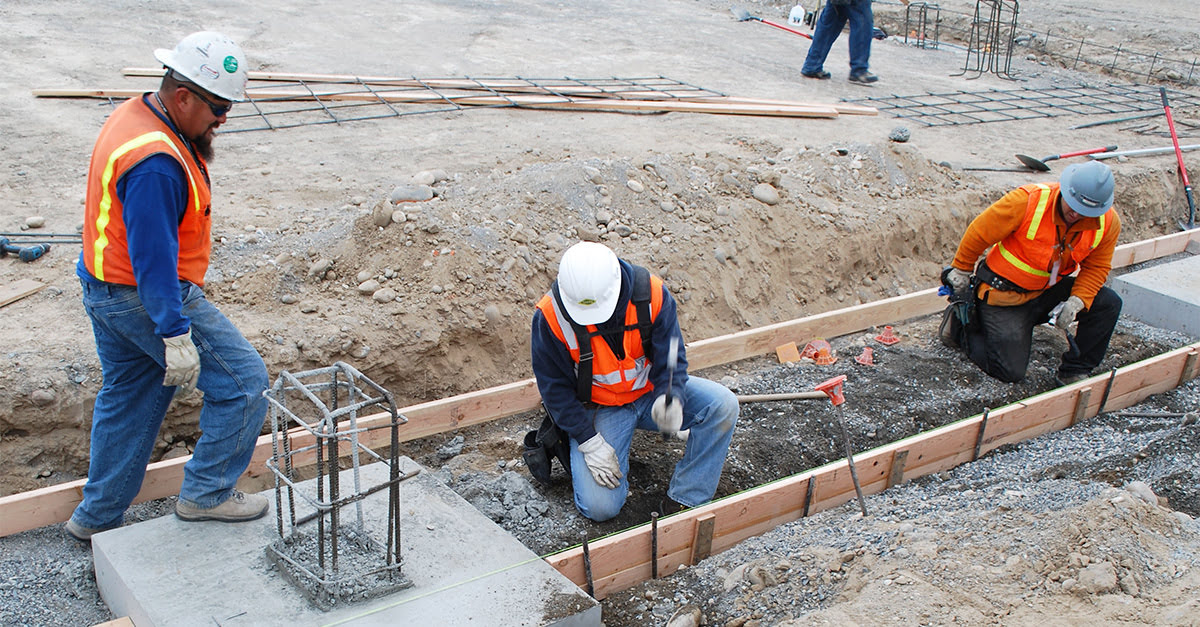Home>diy>Building & Construction>How Does A Bond Work For Construction


Building & Construction
How Does A Bond Work For Construction
Modified: January 9, 2024
Learn how a bond works for construction projects and the benefits it offers in building construction. Find out how to secure a bond for your next project.
(Many of the links in this article redirect to a specific reviewed product. Your purchase of these products through affiliate links helps to generate commission for Storables.com, at no extra cost. Learn more)
Introduction
Welcome to the world of construction bonds, an essential aspect of the building industry. Whether you are a contractor, subcontractor, or project owner, understanding how construction bonds work is crucial for ensuring the successful completion of a project.
In simple terms, a construction bond is a type of surety bond that provides financial protection and assurance to project owners. The bond serves as a guarantee that the contractor will fulfill their obligations as stated in the contract. It acts as a safeguard against financial loss and ensures that the project is completed on time and to the required specifications.
In this article, we will delve into the specifics of construction bonds, exploring their types, how they work, and their benefits. So, let’s dive in and discover the inner workings of construction bonds.
Key Takeaways:
- Construction bonds provide financial protection and assurance, ensuring projects are completed on time and to the required standards. They instill confidence in the contractor’s ability to fulfill their obligations, benefiting all stakeholders in the construction industry.
- While challenges exist, such as the bond approval process and cost considerations, construction bonds play a crucial role in promoting fair competition, quality workmanship, and financial protection. By navigating these challenges, stakeholders can maximize the benefits of construction bonds for successful project execution.
Read more: How Does A Bond Work In Construction
What is a Construction Bond?
A construction bond, also known as a contract bond or surety bond, is a legal agreement between three parties: the project owner, the contractor, and the surety company. It provides a guarantee that the contractor will perform their contractual obligations and meet the project’s requirements. If the contractor fails to meet these obligations, the surety company steps in to compensate the project owner for any financial loss incurred.
Construction bonds are typically required on public projects, and they serve as a form of protection for the project owner. They ensure that the project will be completed even if the contractor encounters financial or other difficulties along the way.
There are three main types of construction bonds:
- Performance Bonds: These bonds guarantee that the contractor will complete the project according to the terms of the contract. If the contractor fails to do so, the surety company will step in to cover the costs of completing the project or hiring a replacement contractor.
- Payment Bonds: Payment bonds protect the project owner and subcontractors by ensuring that the contractor will pay all suppliers, subcontractors, and laborers involved in the project. If the contractor fails to make the necessary payments, the surety company will step in to cover the outstanding amounts.
- Bid Bonds: Bid bonds are submitted by contractors as part of the bidding process. They provide assurance that if the contractor wins the bid, they will enter into a contract and provide the required performance and payment bonds. If the contractor fails to do so, the project owner can make a claim against the bid bond.
These bonds work together to protect the interests of both project owners and contractors, ensuring that construction projects are completed successfully and in accordance with the agreed-upon terms.
Types of Construction Bonds
Construction bonds play a pivotal role in the building industry, providing financial protection and assurance to project owners. Let’s take a closer look at the three main types of construction bonds:
- Performance Bonds: Performance bonds are perhaps the most common type of construction bond. These bonds guarantee that the contractor will complete the project according to the terms of the contract. They provide assurance to the project owner that the contractor has the capability and resources to fulfill their obligations. If the contractor fails to perform, the surety company will step in to cover the costs of completing the project or hiring a replacement contractor.
- Payment Bonds: Payment bonds are designed to protect the interests of subcontractors, material suppliers, and laborers involved in the construction project. These bonds guarantee that the contractor will make all necessary payments to these parties. If the contractor fails to do so, the surety company will step in to cover the outstanding payments, ensuring that the subcontractors and suppliers are compensated for their work and materials.
- Bid Bonds: Bid bonds are often required during the bidding process for construction projects. These bonds provide assurance to the project owner that if the contractor wins the bid, they will enter into a contract and provide the necessary performance and payment bonds. If the contractor fails to do so, the project owner can make a claim against the bid bond, which serves as a form of compensation for the time and resources invested in the bidding process.
Each type of construction bond has its distinct role and purpose, providing various forms of protection to the parties involved in a construction project. Together, they ensure that the project owner is safeguarded against financial loss and that the contractor upholds their responsibilities throughout the project’s lifecycle.
Performance Bonds
Performance bonds are a vital component of construction projects, providing assurance to project owners that the contractor will fulfill their obligations according to the terms of the contract. Let’s explore the details of performance bonds in greater depth:
Performance bonds serve as a guarantee that the contractor will complete the project as specified in the contract documents, including meeting quality standards, adhering to the agreed-upon timeline, and delivering the project within budget. These bonds are typically required for public projects, ensuring that taxpayer-funded endeavors are completed satisfactorily.
When a contractor obtains a performance bond, they are essentially obtaining a guarantee from a surety company, also known as the bonding company. If the contractor fails to meet their obligations, the surety company steps in to remedy the situation, either by completing the project themselves or by hiring a replacement contractor.
The primary beneficiaries of performance bonds are project owners, as they provide financial protection and peace of mind. If the contractor defaults or fails to deliver the project as promised, the project owner can make a claim against the bond to recover any related costs, such as hiring a new contractor or covering additional expenses incurred due to delays or defects.
Performance bonds also benefit subcontractors, suppliers, and other stakeholders involved in the construction project. These parties are assured of payment for their services and materials, as the bond guarantees that the contractor will fulfill their financial obligations.
It is important to note that performance bonds are typically written for a specific project and are valid for the duration of that project. Once the project is completed, the bond is no longer in effect. However, it is common for contractors to obtain new performance bonds for each subsequent project they undertake.
Obtaining a performance bond involves a thorough assessment by the surety company. The surety evaluates the contractor’s financial stability, experience, and track record to determine the level of risk involved. The contractor may need to provide financial statements, evidence of their past performance, and other relevant documentation to satisfy the surety’s requirements.
Overall, performance bonds are a crucial tool in the construction industry, ensuring that projects are completed successfully and in accordance with the contractual terms. They provide financial protection to project owners and stakeholders, fostering confidence and trust in construction projects.
Payment Bonds
Payment bonds are an essential component of construction projects, providing crucial financial protection to subcontractors, suppliers, and laborers. Let’s take a closer look at payment bonds and their significance:
Payment bonds are a type of surety bond that guarantees the contractor will make timely payments to all parties involved in the construction project. These parties typically include subcontractors, suppliers, and laborers who provide services, materials, or labor for the project.
By requiring payment bonds, project owners ensure that subcontractors and suppliers are protected from non-payment or delayed payment by the contractor. This is particularly important in large projects with numerous subcontractors and suppliers, where financial risks and payment disputes can arise.
When a contractor secures a payment bond, they are essentially obtaining a guarantee from a surety company that they will fulfill their financial obligations to subcontractors and suppliers. If the contractor fails to make the necessary payments, the surety company steps in to compensate the unpaid parties.
Payment bonds not only protect subcontractors and suppliers, but they also benefit project owners by ensuring a smooth flow of work. When subcontractors and suppliers are confident in receiving payment, they are more likely to provide their services or materials promptly and efficiently.
To make a claim against a payment bond, a subcontractor or supplier must typically follow a specific procedure outlined in the bond agreement. This may include providing written notice of non-payment or filing a formal claim with the surety company. Upon approval, the surety company will compensate the unpaid party, up to the bond’s specified limit.
It is important to note that payment bonds are typically required for public construction projects, where project owners are obligated to protect the interests of subcontractors and suppliers. However, private project owners may also choose to require payment bonds to ensure the smooth and fair operation of the project.
Contractors seeking payment bonds must undergo a rigorous evaluation process by the surety company. The surety assesses the contractor’s financial stability, past payment history, and capacity to fulfill their financial obligations. This evaluation helps determine the level of risk associated with issuing the payment bond.
Overall, payment bonds are a critical tool in the construction industry, providing protection to subcontractors, suppliers, and laborers. They promote fair payment practices, reduce financial risks, and contribute to the successful completion of construction projects.
Read more: How Does Construction Bonding Work
Bid Bonds
Bid bonds are an essential part of the bidding process for construction projects, providing assurance to project owners that the contractor will fulfill their obligations if awarded the project. Let’s explore the world of bid bonds and their significance:
When contractors participate in the bidding process for a construction project, they may be required to submit a bid bond along with their bid proposal. A bid bond is a type of surety bond that serves as a guarantee that the contractor will enter into a contract and provide the necessary performance and payment bonds if their bid is accepted.
The primary purpose of a bid bond is to protect the project owner during the bidding phase. It ensures that the contractor’s bid is genuine and that they are financially capable of undertaking the project if awarded. By requiring bid bonds, project owners mitigate the risk of contractors submitting frivolous or infeasible bids, as the bond provides a financial disincentive for such behavior.
If a contractor wins the bid and fails to enter into a contract or provide the required performance and payment bonds, the project owner can make a claim against the bid bond. The project owner may be entitled to compensation for the time and resources invested in the bidding process.
The amount of the bid bond is typically a percentage of the total contract value, specified by the project owner or outlined in the bidding documents. It acts as a form of security, demonstrating the contractor’s commitment and seriousness. The bid bond also encourages contractors to carefully consider the financial implications of their bid, ensuring that they have the necessary resources to fulfill the project’s requirements.
Obtaining a bid bond involves the evaluation of the contractor’s financial stability and past performance by a surety company. The surety assesses the contractor’s creditworthiness, experience, and ability to fulfill their obligations. The evaluation helps determine the level of risk associated with issuing the bid bond.
In some cases, if a contractor fails to secure the necessary performance and payment bonds after winning the bid, the project owner may have the right to award the project to the next qualified bidder. This ensures that the project can proceed without significant delays or disruptions.
Bid bonds are commonly required for public construction projects, where fairness, transparency, and accountability are essential. Private project owners may also choose to require bid bonds as a means of protecting their interests during the bidding process.
Overall, bid bonds play a crucial role in the construction industry, promoting fair competition, discouraging frivolous bids, and ensuring that contractors uphold their commitments if awarded the project.
How Do Construction Bonds Work?
Construction bonds are intricate financial instruments that provide protection and assurance for construction projects. Understanding how construction bonds work is essential for all parties involved in the construction process, including project owners, contractors, subcontractors, and surety companies. Let’s explore the inner workings of construction bonds:
1. Obtaining a Construction Bond: The process begins with the contractor seeking a construction bond from a surety company. The surety company evaluates the contractor’s financial stability, track record, and ability to fulfill their contractual obligations. If the contractor meets the requirements, the surety company issues the construction bond.
2. Bond Agreement: The construction bond is a legally binding agreement between three parties: the project owner (obligee), the contractor (principal), and the surety company. The bond outlines the obligations and responsibilities of each party, as well as the terms and conditions for the bond’s validity.
3. Bond Coverage: Construction bonds provide different types of coverage, such as performance bonds, payment bonds, or bid bonds. Each type offers specific protection to the project owner and other parties involved in the construction project.
4. Bond Claims: If the contractor fails to fulfill their contractual obligations, the project owner or other affected parties can make a claim against the construction bond. This may occur due to issues such as project delays, substandard work, or non-payment to subcontractors or suppliers.
5. Surety’s Response: When a claim is made, the surety company investigates the validity of the claim. If the claim is deemed valid, the surety will either compensate the project owner or take necessary action to remedy the situation, such as arranging for the completion of the project or hiring a new contractor.
6. Bond Indemnity: The contractor is ultimately responsible for reimbursing the surety company for any funds paid out in response to a claim. Contractors are usually required to provide collateral or personal guarantees to secure the bond and protect the surety against potential losses.
7. Bond Expiration: Construction bonds have a specific duration, typically aligned with the project timeline. Once the project is completed and all contractual obligations are fulfilled, the bond expires, and the surety’s liability ends.
Construction bonds serve as a financial safety net, ensuring that the project owner is protected against financial loss caused by the contractor’s failure to perform. They provide confidence to project owners, as well as subcontractors and suppliers, that their work will be compensated and that the project will be successfully completed.
It is important for contractors to maintain a good track record of fulfilling their obligations and providing quality work to build trust with surety companies. This allows them to obtain construction bonds more easily for future projects.
Overall, construction bonds play a critical role in the construction industry, providing financial security, fostering fair business practices, and safeguarding the interests of all parties involved in the construction process.
When investing in a construction bond, ensure the contractor is bonded to protect against project delays, incomplete work, or financial issues. Check the bond’s coverage and terms before proceeding.
The Role of the Surety
In the realm of construction bonds, the surety plays a crucial role in ensuring the financial and contractual obligations are fulfilled. Let’s explore the role of the surety in the construction industry:
The surety is a third-party entity, usually an insurance or bonding company, that guarantees the performance and financial obligations of the contractor to the project owner. The surety acts as a risk management partner, providing assurance to the project owner that the contractor will fulfill their contractual obligations.
Here are the key responsibilities and functions of the surety:
1. Evaluation and Underwriting: Before issuing a construction bond, the surety assesses the contractor’s financial stability, experience, and capabilities. This evaluation process, known as underwriting, helps determine the level of risk involved. The surety examines the contractor’s creditworthiness, past performance, and ability to complete the project successfully.
2. Issuing Construction Bonds: Once the surety company has evaluated the contractor and determined that they meet the necessary criteria, it issues the required construction bond. The bond serves as a guarantee that the contractor will fulfill their obligations according to the terms of the contract.
3. Financial Security: The surety provides financial security to the project owner and other parties by ensuring that funds are available to cover any potential losses or claims. If the contractor fails to perform or meet their obligations, the surety company steps in to compensate the project owner or other affected parties.
4. Investigation of Claims: If a claim is made against a construction bond, the surety company conducts an investigation to validate the claim. This involves gathering relevant information, assessing the circumstances, and determining the appropriate course of action. The surety strives to protect the interests of all parties involved and resolve the claim in a fair and efficient manner.
5. Remedy and Rectification: In the event that a claim is validated, the surety takes appropriate action to resolve the issue. This may involve reimbursing the project owner for financial losses, arranging for the completion of the project, or engaging a new contractor if necessary. The surety ensures that the project owner is compensated and the project is back on track, minimizing disruption and financial burden.
6. Bond Premiums and Fees: Contractors seeking construction bonds pay premiums or fees to the surety company. These costs are determined based on factors such as the contractor’s financial standing, industry reputation, project size, and the type of bond required. The premiums compensate the surety for assuming the risk and providing the necessary guarantees.
The surety serves as a safeguard for project owners and other parties involved in the construction industry. By providing financial security and assurances, the surety mitigates risks and promotes confidence, enabling construction projects to proceed smoothly and successfully.
It is important for contractors to establish a strong relationship with a reputable surety company. Building a track record of delivering projects on time and with high quality builds trust with sureties, making it easier to obtain construction bonds in the future.
Overall, the role of the surety is to protect the interests of the project owner, subcontractors, suppliers, and other stakeholders by ensuring that the contractor fulfills their contractual obligations and providing financial security in case of non-performance or default.
The Construction Bond Process
The construction bond process involves a series of steps and interactions between the project owner, contractor, and surety company. Let’s explore the typical stages of the construction bond process:
1. Bond Requirement: The project owner determines the type and value of the construction bonds required for the project. This decision is typically based on factors such as the size of the project, its complexity, and any applicable legal or contractual requirements.
2. Contractor’s Application: The contractor interested in the project submits an application to a surety company to obtain the necessary construction bonds. The application includes detailed information about the contractor’s financial standing, past performance, qualifications, and any other documentation required by the surety.
3. Underwriting and Evaluation: The surety company evaluates the contractor’s application and assesses their creditworthiness, financial stability, and capability to perform the project successfully. This underwriting process involves examining financial statements, reviewing references and project history, and conducting any necessary assessments.
4. Bond Approval: Once the underwriting process is complete, and the surety company is satisfied with the contractor’s qualifications, they approve the issuance of the construction bonds. The surety determines the bond amount, premiums, and any specific conditions or requirements associated with the bonds.
5. Bond Issuance: The surety company issues the required construction bonds to the contractor. The bonds serve as a guarantee to the project owner that the contractor will fulfill their contractual obligations, such as completing the project on time, meeting quality standards, and making payments to subcontractors and suppliers.
6. Bond Indemnity Agreement: As part of the bond issuance, the contractor typically signs a bond indemnity agreement. This agreement outlines the contractor’s responsibility to reimburse the surety company for any costs or claims paid out on their behalf.
7. Bond Execution: The contractor provides the construction bonds to the project owner as proof of their financial and contractual commitment. The project owner verifies the validity and coverage of the bonds before commencing the construction project.
8. Bond Maintenance: Throughout the project’s duration, the contractor is responsible for maintaining the construction bonds, ensuring their validity and compliance with the terms and conditions specified by the surety company. The contractor must fulfill their contractual obligations to prevent any bond claims or disputes.
9. Bond Expiration and Release: Once the project is successfully completed, and all contractual obligations are fulfilled, the construction bonds expire. The surety company issues a bond release document, confirming the closure of the bond and releasing the contractor from any further liability.
The construction bond process is a critical aspect of the construction industry, providing financial security and assurance to project owners and stakeholders. It enables projects to move forward with confidence, ensuring that contractual obligations are met and potential risks are mitigated.
It is important for contractors to establish strong relationships with reputable surety companies, as this can streamline the bond application and issuance process. Maintaining a strong track record of successful projects and fulfilling contractual obligations enhances the contractor’s chances of obtaining construction bonds for future endeavors.
Overall, the construction bond process acts as a mechanism for promoting trust, managing risk, and safeguarding the interests of all parties involved in construction projects.
Read more: What Are Construction Bonds
Bond Rates and Costs
When it comes to construction bonds, understanding bond rates and costs is essential for contractors seeking to obtain these financial instruments. Let’s explore the factors that influence bond rates and the costs associated with construction bonds:
1. Bond Premiums: The primary cost associated with construction bonds is the bond premium. This is the fee paid by the contractor to the surety company in exchange for issuing the bond. The bond premium is typically a percentage of the total bond amount required for the project.
2. Contractor Evaluation: Surety companies assess the financial stability, experience, and track record of contractors as part of the underwriting process. Contractors with strong financials and a proven history of successful projects are generally considered less risky and may receive lower bond premiums.
3. Bond Amount: The bond amount required for the project directly influences the bond premium. Generally, the higher the bond amount, the higher the bond premium. For larger projects with higher contract values, bond premiums may increase accordingly.
4. Project Complexity and Risk: The complexity and risk associated with the project can impact the bond rates. Projects with intricate designs, challenging site conditions, or higher potential for unforeseen issues may incur higher bond premiums due to increased risk exposure.
5. Surety Evaluation: Surety companies use their own risk assessment models to determine the bond rates for each contractor. This evaluation considers factors such as creditworthiness, financial ratios, references, and the surety company’s underwriting guidelines.
6. Bond Type and Duration: Different types of construction bonds may have varying bond rates. Performance bonds, payment bonds, and bid bonds each come with their respective risks and requirements. Additionally, the duration of the bond, which aligns with the project timeline, is also a factor in determining bond rates.
7. Collateral and Indemnity: For contractors considered higher-risk, surety companies may require collateral or indemnity agreements to secure the bond. Collateral may include real estate, cash, or other valuable assets that can cover potential losses. The presence of collateral can influence bond rates.
It is vital for contractors to carefully evaluate the costs associated with construction bonds and factor them into their project budgeting. Bond premiums can vary significantly depending on the factors mentioned above. It is advisable to obtain quotes from multiple surety companies to compare rates and terms.
Contractors can also take steps to improve their bond rates and reduce costs. This includes maintaining sound financial records, building a strong track record of successful projects, and demonstrating a commitment to fulfilling contractual obligations.
By understanding the factors that impact bond rates and costs, contractors can make informed decisions when seeking construction bonds. It is crucial to consider these costs as part of the overall project expenses to ensure profitability and successful project execution.
Ultimately, construction bond rates and costs play a significant role in the financial aspects of construction projects, reflecting the risks and responsibilities associated with these bonds.
Benefits of Construction Bonds
Construction bonds offer various benefits to project owners, contractors, subcontractors, and other stakeholders involved in the construction industry. Let’s explore the advantages of using construction bonds:
1. Financial Protection: Construction bonds provide financial security and assurance to project owners. If the contractor fails to meet their contractual obligations, the surety company steps in to compensate the project owner for any financial losses incurred. This protects project owners from potential damages, delays, or non-performance by the contractor.
2. Quality Assurance: Performance bonds, a type of construction bond, ensure that the contractor fulfills their obligations and completes the project in accordance with the specified requirements and standards. This provides project owners with confidence in the quality and performance of the work being done.
3. Timely Completion: Construction bonds incentivize contractors to complete projects on time. With the surety company’s involvement and the financial consequences of non-performance, contractors are motivated to meet project deadlines and avoid potential penalties or claims against the bond.
4. Payment Protection: Payment bonds, another type of construction bond, protect subcontractors, suppliers, and laborers by guaranteeing their payments. This ensures that they receive compensation for their services, materials, and labor, even if the contractor fails to make the necessary payments. It promotes fair payment practices and reduces the risk of disputes or non-payment issues.
5. Enhanced Contractor Credibility: Contractors who obtain and maintain construction bonds demonstrate their financial stability, experience, and commitment to fulfilling their contractual obligations. This enhances their credibility and reputation in the industry, making them more attractive to project owners and increasing their chances of securing future projects.
6. Improved Surety: Construction bonds provide a layer of protection for surety companies as well. By evaluating contractors and assessing their financial capabilities, the surety reduces its risk exposure and ensures that it is working with contractors who have the capacity to complete projects successfully. This benefits both the surety company and the project owner.
7. Promotes Fair Competition: Bid bonds, a type of construction bond, foster fair competition in the bidding process. Contractors submitting bids with bid bonds provide project owners with confidence that they are serious about the project and have the financial capacity to fulfill their obligations if selected. Bid bonds discourage frivolous bids and maintain a level playing field for all bidders.
8. Risk Mitigation: Construction bonds help mitigate various risks associated with construction projects. They protect project owners from financial loss, provide payment security to subcontractors and suppliers, ensure project completion, and promote adherence to quality and timeline standards.
9. Peace of Mind: Construction bonds offer peace of mind to all parties involved in a construction project. Project owners can feel confident that their investment is protected, contractors can demonstrate their credibility and commitment, and subcontractors and suppliers can trust that they will be paid for their work and materials.
Overall, construction bonds provide numerous benefits that contribute to the successful and smooth execution of construction projects. They instill confidence, protect financial interests, promote fair practices, and mitigate risks for all stakeholders involved.
Common Challenges with Construction Bonds
While construction bonds provide important protections and benefits for the construction industry, they also come with some challenges. Let’s explore some of the common challenges that project owners, contractors, and other stakeholders may encounter when dealing with construction bonds:
1. Bond Approval Process: Obtaining construction bonds can sometimes be a lengthy and complex process. Surety companies thoroughly evaluate the financial stability, track record, and qualifications of contractors before approving bonds. This evaluation process can cause delays in project commencement or bidding activities.
2. Cost Considerations: Construction bonds come with premiums that contractors must pay to the surety companies. The cost of these premiums can vary depending on several factors, such as the project size, duration, and the contractor’s financial standing. Balancing the bond premium costs with other project expenses requires careful budgeting and financial planning.
3. Collateral Requirements: Some contractors, especially those considered higher risk, may be required to provide collateral to secure construction bonds. Collateral can include real estate, cash, or other valuable assets. Meeting the collateral requirements can be challenging, particularly for smaller contractors with limited assets.
4. Complex Projects: Construction projects with unique designs, intricate engineering requirements, or challenging site conditions are often considered high risk by surety companies. Securing construction bonds for these types of projects can be more difficult and may result in higher bond premiums.
5. Surety Evaluation: Surety companies conduct thorough evaluations of contractors before issuing construction bonds. This evaluation can be subjective and vary between different surety companies. Contractors with limited experience or a less-established track record may struggle to obtain bonds or face higher bond premiums due to perceived risk.
6. Bond Claim Disputes: In some cases, disputes may arise between project owners and surety companies regarding the validity or extent of a bond claim. These disputes can cause delays in receiving compensation or resolution, potentially affecting project timelines or causing financial strain on the affected parties.
7. Restricted Bonding Capacity: For contractors who frequently undertake multiple projects concurrently, their bonding capacity may become a limitation. Surety companies assess the contractor’s capacity to take on new bond obligations based on their financial resources and existing bond commitments. Limited bonding capacity can hinder contractors’ ability to bid on larger or multiple projects simultaneously.
8. Project Completion Challenges: While construction bonds provide assurance of project completion, there may still be challenges in ensuring timely and successful execution. Factors such as labor shortages, material delays, changes in project scope, or unforeseen events can impact project progress and result in potential bond claims or disputes.
Despite these challenges, construction bonds remain an essential aspect of the construction industry. Contractors and project owners can navigate these hurdles by carefully planning, maintaining financial stability, establishing strong relationships with reputable surety companies, and adhering to contractual obligations to mitigate potential risks and complications associated with construction bonds.
By proactively addressing these challenges, stakeholders can maximize the benefits and protections offered by construction bonds and ensure the successful completion of construction projects.
Conclusion
Construction bonds are an integral part of the building industry, providing financial protection, assurance, and risk mitigation for project owners, contractors, subcontractors, and other stakeholders. By understanding how construction bonds work and their various types, benefits, and challenges, all parties involved can navigate the construction process more effectively.
Construction bonds ensure that projects are completed on time, within budget, and to the required standards. They provide project owners with financial security, instilling confidence in the contractor’s ability to fulfill their obligations. Performance bonds guarantee the completion of the project, while payment bonds protect subcontractors and suppliers by ensuring timely payment for their contributions.
Obtaining construction bonds involves a thorough evaluation by surety companies, assessing the contractor’s financial stability, experience, and track record. Contractors must demonstrate credibility, maintain sound financial records, and fulfill contractual obligations to establish strong relationships with surety companies and secure bonds effectively.
While there are challenges associated with construction bonds, such as the bond approval process, cost considerations, and collateral requirements, these obstacles can be managed through careful planning, financial prudence, and collaboration with reputable surety companies.
Overall, construction bonds play a crucial role in the construction industry, facilitating fair competition, promoting quality workmanship, and providing financial protection to all parties involved. They contribute to the successful and smooth execution of construction projects, fostering trust, and confidence among stakeholders.
In conclusion, understanding construction bonds and their role in the construction process is vital for project owners, contractors, subcontractors, and other stakeholders. By leveraging the benefits of construction bonds, navigating the challenges, and maintaining strong relationships with surety companies, the construction industry can thrive and continue to deliver successful and high-quality projects.
Frequently Asked Questions about How Does A Bond Work For Construction
Was this page helpful?
At Storables.com, we guarantee accurate and reliable information. Our content, validated by Expert Board Contributors, is crafted following stringent Editorial Policies. We're committed to providing you with well-researched, expert-backed insights for all your informational needs.














0 thoughts on “How Does A Bond Work For Construction”